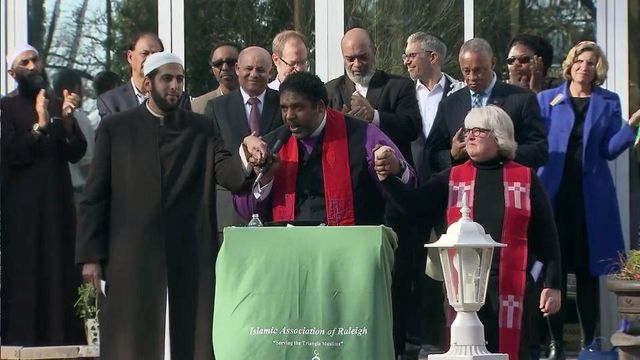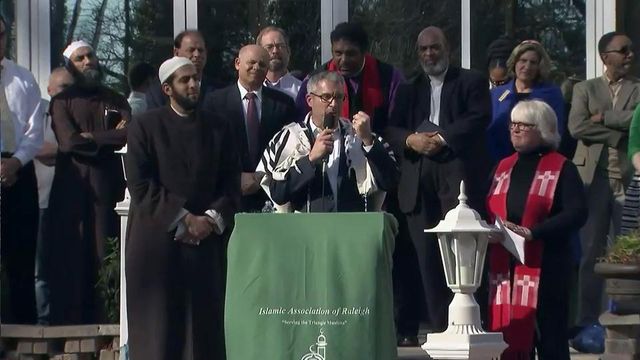Area religious leaders show solidarity with Muslims
Ministers, imams and a rabbi prayed for unity and understanding Friday as part of an interfaith prayer service to show solidarity with the Triangle Muslim community.
Posted — UpdatedThe service at the Islamic Association of Raleigh attracted hundreds and was organized in the wake of recent terror attacks in Paris, France, and San Bernardino, Calif., and a call by Republican presidential front-runner Donald Trump to block all Muslims from entering the United States.
"We will not let hate and fear divide us," said Rev. Nancy Petty, pastor of Pullen Memorial Baptist Church in Raleigh. "A people of faith, as moral, ethical human beings, we cannot remain silent or invisible at the rise of intolerance, prejudice and hostility toward our Muslim brothers and sisters here in America."
Oliver Mohammed, senior imam at As Salaam Islamic Center in Raleigh, said the terrorists in France, California and the Middle East "are comprised of the worst among humanity" and shouldn't be associated with Islam.
"They have lost their human identity as well as their religious identity," Mohammed said. "No religion promotes terrorism. These heinous, criminal acts perpetrated in the name of religious belief are a shameful veil on the true beauty of our faith."
Petty cited the mass shooting at a black church in Charleston, S.C., and a Florida preacher who burned the Quran in noting that "radicalization is not limited to one faith, one people or one religion."
"The enemy in this country and in our world is not Muslims. The enemy we face as humanity is radicalization," she said. "We stand together as Muslims and non-Muslims to condemn killing in the name of any religion. Islam, like Judaism and Christianity, is a religion of peace, of nonviolence and of compassion."
Rabbi Eric Solomon of Beth Meyer Synagogue in Raleigh said his grandparents faced anti-Semitism when they arrived in the U.S., so he feels a special affinity with Muslims who are now being told they likewise should stay out of the country.
"Language matters, language hurts and language can lead to violence," he said. "We stand here as a Jewish community to say ... we will not stay idly by and let anyone speak about a religious minority in any other language aside from love, respect and tolerance."
Solomon compared Friday's interfaith gathering to a living menorah, saying the Jewish holiday of Hanukah is about bringing light to darkness and that hatred and intolerance are the most pervasive darkness in the world today.
Rev. William Barber, state president of the NAACP and pastor of Greenleaf Christian Church in Goldsboro, said clergy should have united sooner to squelch the anti-Islam climate in America that has allowed Trump's inflammatory rhetoric to thrive.
"They have labored in the laboratory of racism and Islamo-phobia and fear and hate and xenophobia and now have created a Frankenstein atmosphere of hatred that is out of control," Barber said. "The issue is not so much what the hate-mongers say, but the greater tragedy would be if we would remain silent."
Nearly 300 mass shootings have occurred in the U.S. so far this year, he said, and the vast majority weren't committed by Muslims.
"If we are to fear anything, we need to fear our appetite for violence," he said. "So, let us resist every stereotype and pledge to work that we might be one nation under God, indivisible, indivisible, indivisible, indivisible, indivisible, indivisible with liberty and justice for all."
As Barber repeated "indivisible," getter louder with each word, he and other clergy joined hands, and they then held a moment of silence.
Mohamed AbuTaleb, imam of the Islamic Association of Raleigh, said the gathering filled him with hope that the voices of intolerance will be drowned out.
"We choose compassion over hate, we choose understanding over division, and we choose community over going our separate ways," AbuTaleb said.
Mohamed Elgamal, chairman of the Islamic Association, said the gathering is but the first step toward tolerance and understanding.
"Sometimes, people don't believe you unless you build relationships, human relationships," Elgamal said. "I think that comes by talking, communicating and sharing things, sharing food, sharing thoughts, sharing love."
"I'm really proud how the Triangle community comes together for its unity and diversity and the way it comes together in these challenging and sometimes unpleasant times," said Imran Aukhil, spokesman for the Islamic Association.
• Credits
Copyright 2024 by WRAL.com and the Associated Press. All rights reserved. This material may not be published, broadcast, rewritten or redistributed.






